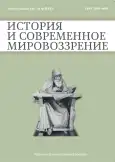Worldview Reasons for the Evolution of the Image of the Past (XIX-XXI Centuries)
- Autores: Gerasimov G.I.1
-
Afiliações:
- Tula Museum of weapons
- Edição: Volume 4, Nº 1 (2022)
- Páginas: 33-40
- Seção: Articles
- URL: https://bakhtiniada.ru/2658-4654/article/view/147207
- ID: 147207
Citar
Texto integral
Resumo
Texto integral
##article.viewOnOriginalSite##Sobre autores
Grigory Gerasimov
Tula Museum of weapons
Email: ggi1957@mail.ru
Dr. Sci. (Hist.), Associate Professor; Scientific consultant Tula, Russian Federation
Bibliografia
- Ankersmit F.R. History and tropology: the rise and fall of a metaphor Moscow: Progress-Tradicija, 2003. 496 p.
- Dilthey V. Collected works: In 6 volumes. V. 3. Construction of the historical world in the sciences of the spirit. Moscow: Tri kvadrata, 2004. 419 p.
- Cohen G. Kant's theory of experience. Moscow: Akademicheskij Proekt, 2012. 618 p.
- Konstantinov F. Historical materialism // Philosophical Encyclopedia. In 5 volumes. Moscow, 1960-1970.
- Koposov N. Ye. How historians think. Moscow: Novoe literaturnoe obozrenie, 2001.326 p.
- Lubsky A. V. Alternative models of historical research. Moscow: Social'no-gumanitarnye znanija, 2005. 349 p.
- Marx K., Engels F. German ideology / Marx K. and Engels F., Soch. 2nd ed. T. 3. Moscow: Gosudarstvennoe izdatel'stvo politicheskoj literatury, 1955. 629 p.
- Marx K. To the criticism of political economy / Works. T. 13. S. 7. Moscow: Gosudarstvennoe izdatel'stvo politicheskoj literatury, 1959. 771p.
- Marx K. Capital. Preface to the first edition / K. Marx and F. Engels, Works. T. 23. Moscow: Gosudarstvennoe izdatel'stvo politicheskoj literatury, 1961.745p.
- Nietzsche F. On the benefits and harms of history for life // Nietzsche F. Works. In 2 volumes.Vol. 1. Moscow: Mysl', 1990. 830 p.
- Plotnikov H. S. Life and history. Wilhelm's Philosophical Program Dilthey // Dilthey V. Collected works. In 6 volumes. Vol. 1. Moscow: Dom intellektual. kn., 2000. 762 p.
- Postmodernism / Philosophy: Encyclopedic Dictionary. Ed. A.A. Ivina. Moscow: Gardariki, 2004.1072 p.
- Raymond Aron. Selected: An Introduction to the Philosophy of History. М.: Per Se; Sankt-Peterburg: Universitetskaja kniga, 2000. 543 p.
- Rickert G. Nature sciences and culture sciences. Moscow: Respublika, 1998. 413 p.
- Savelyeva I. M., Poletaev A. V. History and time. In search of what was lost. Moscow: Jazyki russkoj kul'tury, 1997. 800 p.
- Sorokin P. Man. Civilization. Society. Moscow: Politizdat, 1992. 542 p.
- Tarnas R. History of Western thinking. Moscow: Izd. dom «KRON-press», 1995. 444 p.
- Tosh D. Striving for truth. How to master the skill of a historian. Moscow: Izdatel'stvo «Ves' Mir», 2000. 296 p.
- Febvre L. Battles for history. Moscow: Nauka, 1991. 629 p.
Arquivos suplementares








